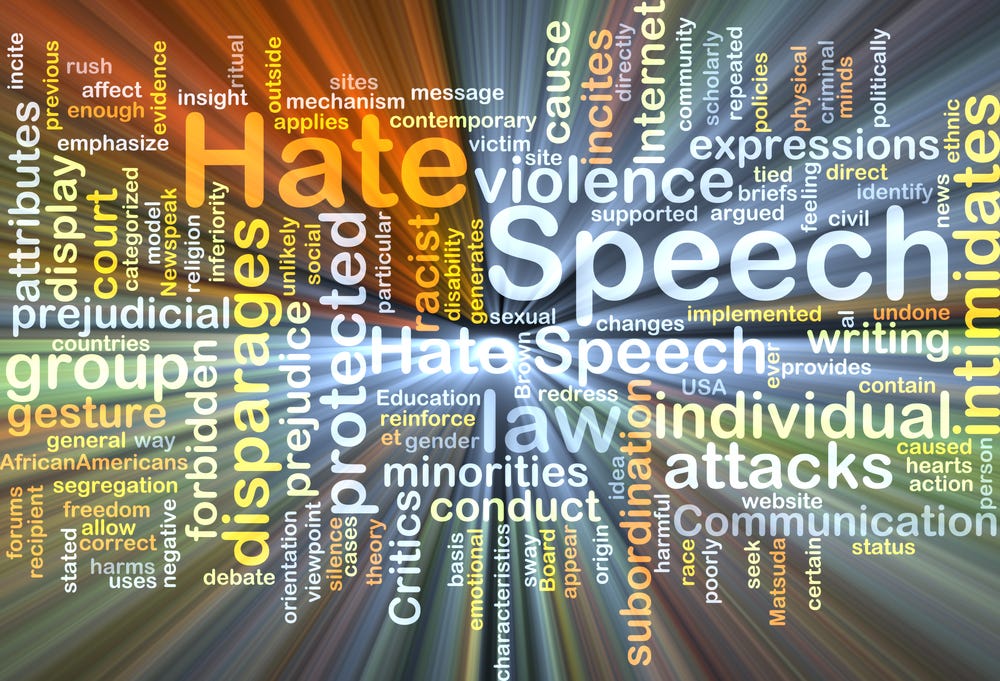
Previously, we looked at the notion of “Magic Words:” words which have been imbued with a magical-type power to change the course of conversations and even thinking. The postmodern movement argued that words have no intrinsic meaning and are just masks for power. It should not surprise us that those who thought in this way would then start to use words as a means of power and control over thought. I have dubbed the words they use to form discourse to be “Magic Words.” Last time I looked at “love,” and now we turn to its opposite: “hate.”
Love is Good and Hate is Bad
In general, everyone agrees that to love is good and to hate is bad. It seems self-evident that we should be loving people, but, as is often the case, it is not really that simple. First, “love” has become ambiguous and is tied to the idea of “positive tolerance” with the implication that to show love is to accept and affirm everything which others do. This also then changes the meaning of “hate” from what it has historically meant. Today, “hate” is defined as not affirming and celebrating everything someone else does. Even to disagree is often defined as hateful.
This idea has turned “hate” into a Magic Word because nobody wants to be considered hateful. The very label “hateful” is used to silence, or sideline, anyone who does not agree with the movement of the day. This can even be seen in how if someone tries to disagree, they must first go into a lengthy defense to show they are not hateful.
The labeling of those who hold to biblical morality as hateful has created the ironic situation where it is then OK to hate them. It is, in the contemporary understanding, acceptable and even right to hate those who are deemed hateful. This is why we have heard of times when protestors and others have threatened violence against those who disagree. In fact, when someone is labeled as hateful, then all manner of attacks against them are allowable.
Postmodern philosophy sees power as central to everything and defines the application of power and privilege as “hate” which is then found everywhere and understood to be totally corrupting. Hate is considered the manifestation of power and privilege within the "matrix of domination." In other words, hate is when those who have power and privilege use that power and privilege to keep others down.[1]
From a biblical perspective, some things are right to hate. Amos 5:15 tells us “Hate evil, and love good, and establish justice in the gate” (ESV). So, we should hate rape. We should hate child exploitation. We should hate all evil, including that which wells up inside ourselves.
The generalizing of love and hate as Magic Words has effectively removed all nuance and thoughtfulness in our discussions. Today, whoever can claim the banner of love is good and whoever gets labeled as hateful is assumed to be bad.
The Damage Caused by Confusion over “Hate.”
This confusion over what “hate” means not only silences those who are declared to be hateful, but it also causes unnecessary fear. Many within the LGBTQ2+ world fear Christians because of the misuse of this notion of hate. Traditional Christians have been declared to be hateful and to have hate towards others, for example lesbians. As a result, now a lesbian not only thinks a Christian is mean, but also that the Christian literally wants to harm her in some way.
This has been exacerbated by the few Christians who do mean things in the name of Christianity. Most notably would be the Westboro Baptist Church and their protests at funerals for military personnel and even victims of school shootings. These individuals have given a public example which allows many to label all Christians as hateful.
This means having a meaningful conversation often requires work to dismantle this impression that Christians are hateful. Many start with the assumption Christians hate them and will seek to harm them in some way. Therefore, we need to work all the harder to show love and break down barriers.
After all, Jesus taught us in the sermon on the Mount, “You have heard that it was said, ‘You shall love your neighbor and hate your enemy.’ But I say to you, Love your enemies and pray for those who persecute you” (Matt 5:43-44). As Christians, we are to hate the evil yet pray for and show love to the individual who commits the evil.
Likewise, we should not refrain from speaking the truth out of fear that someone will label it hateful. For someone to call something hate, does not mean it is hate. We should, however, take care to make sure that we are, in fact, speaking the truth in love.
[1] James A. Lindsay and Mike Nayna, “Postmodern Religion and the Faith of Social Justice” (Areo, 18 December 2018), https://areomagazine.com/2018/12/18/postmodern-religion-and-the-faith-of-social-justice/.

